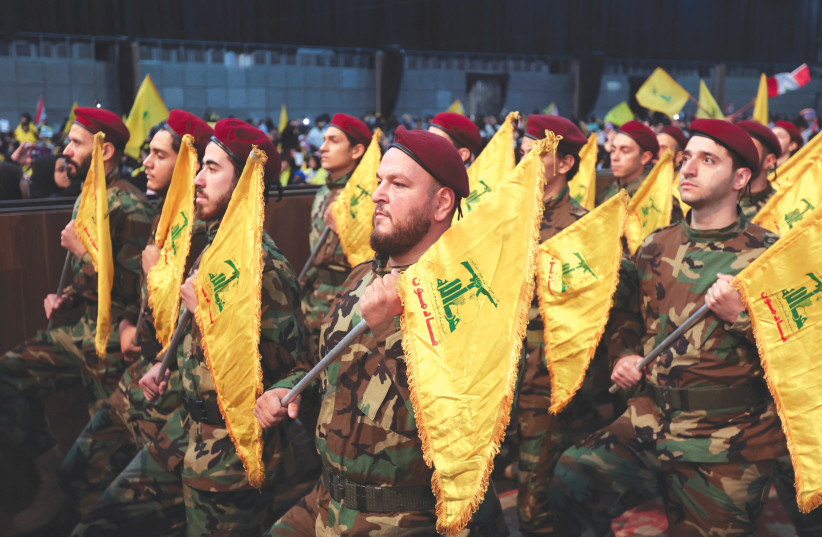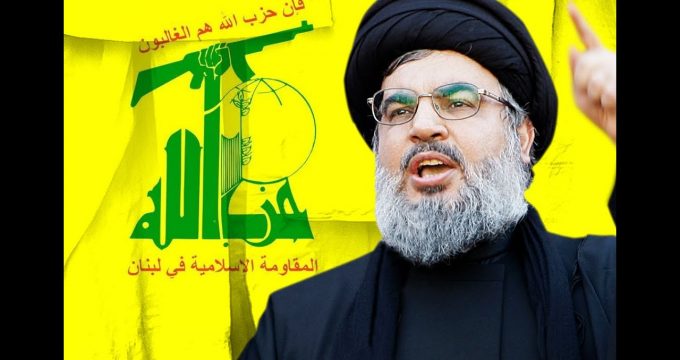ANALYSIS: Hezbollah, the Iranian Axis and the Internal Crisis in Israel
The Iranian axis sees a unique opportunity in Israel’s civil strife, as evidenced by an unprecedented terrorist attack in northern Israel earlier this month.

On Monday, March 13, a terror attack took place at the Meggido intersection near the city of Afula in northern Israel, which the Israeli army (IDF) almost immediately attributed to the Lebanese terrorist organization Hezbollah.
A terrorist detonated an explosive device hidden near a bus stop at the intersection.
Normally there are many soldiers who take a bus home from the neighboring army base at the bus stop.
However, in this case, there were no waiting passengers at the bus stop. A single vehicle that had happened to stop there was hit by shrapnel from the bomb injuring the driver.
The terrorist initially managed to escape in a waiting car, but was later shot dead at a roadblock. His driver was injured.
The IDF launched an investigation after the attack and found that the terrorist had come from Lebanon, where he had climbed a ladder to cross the border fence and then got a lift from an Arab living in Israel.
During the interrogation, the driver later confessed that he had acted as an accomplice.
Other weapons were found in the Arab’s car, including a an anti-personal mine loaded with metal balls.
It was clear that a greater disaster had been averted at the roadblock.
Hezbollah behind the new attack
A follow-up investigation by the IDF revealed that the terrorist had received help from a new terror group called the “Galilee Force – Lonely Wolves.”
This group is affiliated with Hezbollah and used the terminology of the Lebanese terror organization to claim indirect responsibility for the attack.
It has long been known that Iran is trying to build a front in northern Israel by recruiting Israeli Arabs and forming sleeper cells that will jump into action in a future offensive by the so-called “Resistance Axis.”
This is the name Iran and Hezbollah have given to the alliance of Palestinian terror groups such as Hamas and Palestinian Islamic Jihad (PIJ), Hezbollah and other Shia militias, as well as the Quds Force of the Iranian Islamic Revolutionary Guard Corps (IRGC).
PIJ in particular has been very active in the struggle against Israel over the last year, and is also responsible for the formation of new terror cells mainly in Samaria.
These new groups are responsible for the increased shooting attacks against Israeli civilians and IDF soldiers in Samaria. Last Saturday evening, for example, again near the village of Huwara in Samaria, two IDF soldiers were wounded by bullets fired from a passing car at their vehicle.
It was the third shooting attack in the Huwara area within one month.
Nasrallah’s obsession with Israel
After the terror attack in Megiddo, Hezbollah leader Hassan Nasrallah triumphantly claimed that “Israel was confused” by the incident. Furthermore, he warned the IDF against retaliatory action, saying it would lead to an immediate response from “the Resistance.”
However, the Israeli response was not long in coming.
On Sunday, March 19, PIJ leader Ali Ramzi al-Aswad was shot dead near his home in the Qudssaya neighborhood of Damascus, Syria.
The PIJ engineer was reportedly working to increase and improve the Palestinian terror organization’s arsenal of weapons.
According to Arab sources, the attack was a classic operation carried out by Mossad, Israel’s foreign intelligence service. While Israel declined to comment on the death of al-Aswad, it is certain that the Israeli security services and the IDF operate from the perspective that the increase in terror attacks, including the one in Megiddo, are the result of the expanding activities of the “resistance axis.”
They are aware of recent meetings Nasrallah had with leaders of Hamas and PIJ in Damascus, where the agenda included improving cooperation and coordination between the various groups and Hezbollah.
At the end of February, another Hezbollah meeting with engineers from Syria and Iran was bombed by the Israeli air force.
That meeting was about expanding Hezbollah’s precision missile arsenal and the production of unmanned aerial vehicles.
The IDF and Ramadan
The reason the IDF continues to carry out raids on Palestinian towns and villages, mainly in Samaria, despite understandings reached at summits organized by Jordan and Egypt in the Red Sea resort cities Aqaba and Sharm el-Sheihk, is also due to the growing threat of the “resistance axis.”
These raids are part of the IDF operation called “Wave Breaker” that started in April 2022 after a series of terror attacks in Israeli cities.
Now that the Muslim fasting month of Ramadan has started, more attacks are expected.
Statistically, it has been proven that Ramadan increased Palestinian violence every year.
However, this year there is an additional cause for concern due to internal Israeli unrest over judicial and other reforms that the right-wing government of Prime Minister Benjamin Netanyahu is currently preparing.
Israel’s enemies, and in particular PIJ and Hezbollah, see the internal strife in Israel as a sign that the Jewish state is disintegrating and that the strength of the IDF is diminishing.
Nasrallah’s speech
Nasrallah is obsessed with everything that happens in Israel and visibly enjoys the current turmoil in Israeli society.
The Hezbollah leader and PIJ leaders see what is happening with some of the Israeli army reservists who are now refusing to serve and may have concluded that this could be the right time to enter into the long-anticipated confrontation between the Iranian axis and Israel.
Anyone who thinks that Nasrallah’s rhetoric should not be taken seriously should look at what is going on just across the border in northern Israel at the moment.
It is also useful to include the ever-deteriorating situation in Lebanon in assessments of the growing threat to Israel posed by Hezbollah and its allies.
Meanwhile in southern Lebanon
Hezbollah has now completed the build-up of its elite forces, such as the elite Radwan unit and has completely taken over southern Lebanon.
Black and white SUVs of the Radwan unit regularly drive along the border, and 30-meter-high observation posts have also been erected in various places.
In total, Hezbollah now has erected more than 30 such observation posts along the border with Israel.
From the SUVs and the observation posts, Hezbollah terrorists document the movements of the Israeli army on the other side of the border.
Provocations are also regularly reported against IDF soldiers, but also against residents of the city of Metulla in the far north of Israel.
Residents of this city reported that they cannot sleep at night because of the lasers that Hezbollah aims at Metulla. Recently, the terror group also dumped tons of cow dung along the border fence opposite the town.
This was done because a plague of flies will arise with the rising temperature and will make life in Metulla unbearable. Mayor David Azoulai decried what he called “biological warfare.”
Similarities with earlier wars
According to Azoulai, the situation is starting to resemble the run-up to the Second Lebanon War.
At the time, Hezbollah used the same type of provocations, and an Israeli response was usually not forthcoming.
In this case, too, the IDF is too passive, according to the mayor of Metulla, who also has no faith whatsoever in the UN’s UNIFIL peacekeeping force stationed in southern Lebanon.
After the war in the summer of 2006, UNIFIL should have kept Hezbollah out of southern Lebanon according to UN Security Council Resolution 1706, but until now has only mapped out the alarming re-conquest of southern Lebanon and otherwise remains passive.
In Israel, concern about the current situation is only increasing and there seems to be a limited number of policymakers who understand the seriousness and the scope of the crisis.
The public, fed by the TV media, is too obsessed with the internal crisis to see the impending danger.
In that respect, the situation is now reminiscent of the run-up to the Yom Kippur War and to the already mentioned Second Lebanon War, when warnings from experts about the imminent danger and the unpreparedness of the IDF were ignored because people in charge of the wellbeing of Israel thought there were other priorities.
Crisis in Lebanon
People don’t seem to understand what is happening in the countries around Israel and especially in Lebanon.
The massive crisis in the once-prosperous country is only increasing, and a solution seems increasingly distant.
Even the International Monetary Fund (IMF) now appears to be despairing at the reluctance or unwillingness of the ruling elite to take the necessary steps to avoid a total collapse of the Lebanese state.
The IMF has imposed restructuring conditions on a $3 billion loan that could prevent Lebanon’s immediate bankruptcy. However, a year after an agreement was reached with the Lebanese government, virtually nothing has happened.
An IMF delegation that visited Beirut last week said Lebanon has now entered into a “very dangerous situation.”
Since Hezbollah controls almost everything in Lebanon, it is also clear that the organization is looking for a ‘lightning rod’ and that could mean renewed military conflict with Israel.
After all, the Second Lebanon War was also a lightning rod for Iran. The decision to go to war with Israel was taken at a meeting in Damascus between Nasrallah and Qassem Soleimani, the then-commander of the IRGC’s Quds Brigade. The reason was that Iran feared sanctions over its nuclear program by the G7+1 countries.
Prime Minister Benyamin Netanyahu’s firing of his Defense Minister Yoav Galant was according to the Israeli media mainly due to Galant’s position on judicial reform.
But Galant’s decision to remain passive in light of the growing refusals of IDF reservists now that Israel’s security situation is significantly deteriorating once again seems to be the real reason Netanyahu dismissed his defense minister.
The Israeli PM has repeatedly made clear that the insubordination of the IDF and IAF reservists is a red line that should not be crossed.
After all, there has always been consensus about the need to keep the army out of the political theater in Israel, and for good reason as the analysis of the current security situation of Israel shows.

No comments:
Post a Comment